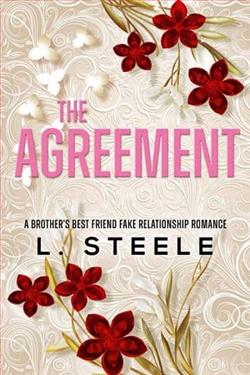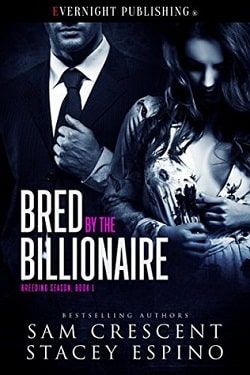Page 24 of Going Home in the Dark
“I don’t believe that’s up to us. I get the feeling shit is going to keep coming our way as fast as we can deal with it. So, for God’s sake, don’t go into a fugue state and start painting things that you don’t even know what they are.”
“I have to be in my studio, with a brush in hand, before it can happen. And even then, it doesn’t always.”
Rebecca closed the lid of the window seat and grimaced at the draperies, though not as impressively as Spencer had grimaced for another reason. “Maybe Ernie needs this atmosphere to write his songs, but it’s too much Western movie for me. And I’m hungry.”
Spencer suggested they park their rental cars at the motel and go to dinner in his SUV. “How about Adorno’s?”
Rebecca smiled. “Like old times, if it’s still in business.”
“From what I’ve seen, it will be. Nothing much changes in Maple Grove.”
Staring at the closed lid of the window seat, Bobby the Sham heard himself speaking in a most tenderhearted tone that wasn’t common to him. His voice even conveyed a tremor of emotion. “It doesn’t feel right, leaving him here alone.”
Each of these amigos had been to an extent hard-boiled by making their way to success in the merciless industries of film, art, and literature, where envy was epidemic and the second-worst cause of career death, backstabbing, was exceeded only by front-stabbing with a smile. Because Rebecca had risen through the brutal film business, she was of course the toughest and most practical of the three, and her recent spasm of enlightenment had made her acutely aware of that.
Although she loved Ernie, she was blunt in her assessment of the situation. “Each of us has been alone since we split up all those years ago, and each of us was alone before we ever became amigos. One of us being alone is nothing new.”
15Ernie Alone
When bears hibernate, do they dream away the winter? In this age when we are told that science has explained the universe and answered all the big questions, it seems that we ought to know if bears dream. However, we lack this knowledge because, sadly, those intrepid scientists who have ventured into the dens of bruins to study their brain activity with a compact, portable battery-powered electroencephalogram have never gotten further than shaving small spots on the sleeping subject’s scalp and attaching electrodes with a conductive paste. Before an adequate reading can be taken, there occurs either a violent mauling or dismemberment or evisceration with extreme prejudice—or all three. Nothing good happens to the electroencephalogram machine, either.
We might expect that the sleeping bear would be injected with a powerful sedative, administered from a distance by a hypodermic-dart gun. Any competent scientist would dismiss that notion with scorn if not searing contempt, and rightly so. Hibernation is anaturalstate to which bears succumb, whereas sedation isunnatural. If the bear were to be sedated with a significant dose of zolpidem or zaleplon, whereafter brain patterns indicative of dreaming were observed, that would prove nothing about whether the animal dreams during natural hibernation. This vital information will be acquired only after some fortunatescientist chances upon a bear that is a particularly deep sleeper, which may well require the sacrifice of a great many more highly educated individuals before the right bear is found.
This raises the obvious question, “What about worms?” Recently, scientists discovered long, pale worms frozen in Arctic ice, where they had been in stasis for thousands of years. When thawed, these worms came back to life, as vigorous and inquiring as contemporary worms that had not suffered such an ordeal. During those centuries, did the hibernating worms dream? What fascinating fantasies might they have experienced as they slept? Scientists very much want to know, but they are foiled by the fact that the brains of these worms are so small that no electroencephalogram has yet been invented with electrodes so tiny they can be securely attached where required. And then there is the problem of determining which end of the worm is the head, if either.
If the question of whether hibernating bears and worms dream remains unanswered—and it does—we cannot hope to know if Ernie Hernishen was dreaming in suspended animation while swaddled in the space under the lid of the window seat. We could speculate, but to no useful end.
What can be said is that, after the three amigos departed, the house remained quiet for some time. Not silent, you understand, for even deserted houses produce small sounds. The creak and crack of expanding and contracting wood. The knocking of a trapped air bubble making its way through the plumbing. The refrigerator motor cycling on and off.
When a louder noise arose, it was a strange squishing sound combined with what might have been the mortal gagging of someone choking on a wad of inadequately chewed beef caught in his windpipe, punctuated by the metallic trilling of a cricketor other insect. Whatever the source of this guggle and swash, no cry of distress accompanied it, as it seemed ought to be the case.
The disturbance progressed from the kitchen, along the hallway, into the living room. The lid of the window seat made a distinctive sound as it was raised, after which a couple of minutes passed in a contemplative quiet except for brief spates of insectile vibrato. No hiss or sigh could be heard, no inhalation or exhalation. Then came sounds that were clearly those made by a clumsy individual trying to extract something of considerable weight from within a window seat. The lid closed with a clonk. The peculiar and unpleasant mélange of squishing and gagging and trilling receded across the living room, along the downstairs hallway, and into the kitchen as a mysterious individual conveyed its burden toward an unknown lair with a purpose that was no doubt unholy.
16Friends at Dinner
This was a century of rapid change so disorienting that many people could cope only by medicating themselves. Therefore, it is no surprise that, in the years during which the three amigos were gone from Maple Grove, Adorno’s Pizzeria had become Adorno’s Ristorante with a full menu of Italian dishes in addition to their legendary pizza. The premises had doubled in size. The speckled vinyl flooring had been replaced with porcelain tiles made to look like limestone. Gone were the red Formica tables with chrome legs; now tables of unknown construction were covered with white tablecloths. The red leatherette booths had been upholstered in black; even the tables flanked by facing banquettes were draped in white, and between booths were new etched-glass panels to provide a measure of privacy. Gone, the policy of self-seating; there was a hostess now, and the waiters wore uniforms of black slacks, white shirts, and white aprons. There was no chance whatsoever that pizza was still sold by the slice.
Because Adorno’s had been a refuge for the four amigos back in the day, Spencer Truedove felt the urge to protest the new Adorno’s by screamingNoooooooas the hostess led them to a booth, but he restrained himself. Although he painted bizarre, repulsive subjects of mysterious nature that adoring critics called “the most riveting depictions of existential despair ever committedto canvas,” Spencer was a traditionalist when he wasn’t lost in a fugue state. He found change distressing, and he was suspicious of the progress that so many people celebrated. The atomic bomb was progress when compared to lesser explosives before it, and then came the hydrogen bomb, and lately thesupersonichydrogen bomb, which could blow up the world twenty-two minutes faster. Wind and solar power were killing entire species of birds; mining and processing of the rare-earth minerals needed to service those industries and to make billions of lithium batteries was creating more devastating pollution in one decade than occurred in the past half century of fossil fuels. Now that Adorno’s Pizzeria had become a ristorante, any change could be forced on the world; anything could happen.Anything.
Spencer and Bobby sat on one banquette in the booth and Rebecca sat on the other banquette. As the hostess put down three menus, she said, “The wig and glasses are okay, Ms. Crane, but your perfect nose gives you away. You should add a bad nose to your disguise, maybe one that has a hook or one that’s squashy-looking.” Rebecca thanked her for the advice. The waitress winked at Bobby. She said, “Cool hat,” to Spencer. And then she went away.
“I’m not gonna take off my hat,” Spencer said with the firmness of a man who knows his rights. “I lent it to Ernie to get him out of the hospital, but I’m not taking it off again, not even for dinner.”
“No one’s asking you to take off your hat,” Bobby said.
Spencer surveyed the restaurant. “When we came here as kids, guys wore baseball caps, knitted caps, Stetsons, straw hats, any hat they wanted, but it’s not that kind of place anymore. No guy in here except me is wearing a hat at dinner, but I don’t care.”
“Nobody cares,” Rebecca assured him.
“I might even sleep in my hat.”
“Good for you,” she said.
“They ruined a fine thing.”
“The food is probably still delicious,” Bobby said. “It smells great in here.”
“Everybody’s got to go and change what doesn’t need changed. Take that wall, for instance.”















